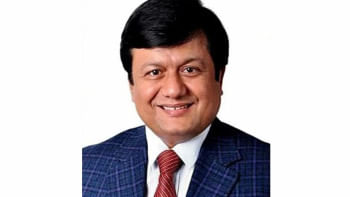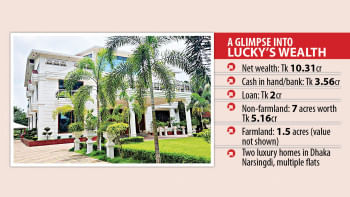Wealth accumulation: Heaps of stocks expose Matiur’s wrongdoing
NBR official Md Matiur Rahman, who has come under the scanner amid controversy over his wealth, has made a big fortune through investments in the stock market, raising questions about the means he applied in the process.
In a recent interview with private television ntv, Matiur, who was yesterday removed from NBR and attached to the finance ministry, admitted that he used his expertise and insights about the capital market to buy shares of ailing but potential companies to make financial gains.
In his own admission, the career tax official would sit with owners of listed companies and visit firms to identify their weakness and offer solutions for growth. In essence, he would buy company shares in their rainy days and trade them when the share value shot up.
"This gives you a good gain," he said, adding that he also offered consultancy for initial public offering (IPOs) to help companies float shares to raise money from the public.
Matiur's admissions offer vital clues as to how people with power and influence over public institutions can become a money-making machine. What happened in Matiur's case is simple yet intriguing: he entered the share market with insider information, an unlawful practice as per the capital market regulations, to mint money.
The regulation against inside trading is meant to safeguard general investors against those with privileged information who can make gains or avert losses that the general investors cannot.
The controversy over Matiur and his family's wealth comes amid ongoing investigations and public discussions about massive wealth of a number of other top current and former government officials and their family members.
An initial tally by The Daily Star shows he and his company held more than 3 crore shares of at least 10 companies – but this figure may rise.
Matiur, who also worked at Chattogram Customs and Large Taxpayer Unit (LTU), VAT, told ntv on Wednesday that he started investing in the capital market in 2008.
He also acknowledged that he made "abnormally high" money from the shares of Fortune Shoes. He bought the company's shares at Tk 8 whose face value was Tk 10, and sold them at Tk 54 each.
"I had a deal with the owner of the shoemaker to offer consultancy to bring the company to the stock market. In return, the owner gave me shares at Tk 8."
He did not respond to our calls and text messages over the last two days.
According to the Companies Act, a company can sell shares at a discount price but with approval from the High Court, and it must be shown in the company's financial reports.
However, the company did not take any approval and did not show it in the financial report of 2015-16 when it got listed. Moreover, the IPO prospectus showed that all shareholders bought shares at face value of Tk 10 each.
Under service rules, government officials cannot work as consultants to facilitate companies to be listed in the capital market. The securities rules also have no option for any individual to offer consultancy related to IPO listing.
It is the job of merchant banks with issue management licences, and there are 66 such merchant banks in Bangladesh, according to BSEC data.
The merchant banks offer their service against a fee, and cannot accept any shares from the company, according to company listing regulations of 2015.
"The issue manager is in no way connected with the issuer and does not hold any of its securities," the regulations say.
Faruq Ahmad Siddiqi, a former chairman of BSEC, said a public service-holder should not offer such consultancy. The securities rules also have no option for that.
"Why did the company give him shares at Tk 8? This is a serious allegation of irregularities that the official himself revealed. It should be investigated thoroughly," he said.
A top merchant banker, who usually offers IPO consultancy service, said Matiur indicated in the interview with that he got shares before listing and no company in Bangladesh sells shares at discount.
"Most companies have to give shares to some influential people as bribes without getting any money or at a lower price."
Usually, companies provide placement shares to regulatory officials to curry favours, he added.
According to the IPO prospectus of Fortune Shoes, Matiur received 5 lakh shares of the company, which was 0.67 percent of the total shares of the company in its pre-IPO period.
His second wife Shammi Akter (Shibli) received 10 lakh shares; his daughter Farzana Rahman 16.50 lakh shares; and his son Ahmed Tawfiqur Rahman Arnab 9 lakh shares, according to the prospectus of Fortune Shoes.
He also received shares from ACME Pesticides, Associated Oxygen, C&A Textiles, Dominage Steel, Lub-rref (Bangladesh), Mamun Agro, ML Dyeing, Ring Shine and SK Trims, according to the company prospectus seen by The Daily Star.
He received 37 lakh shares from Acme Pesticides and 14.5 lakh shares from Associated Oxygen. His first wife Laila Kaniz Lucky had 4.5 lakh shares and his son Ahmed Tawfiqur Rahman Arnab 5 lakh shares from Associated Oxygen.
From a single company -- C&A Textiles -- he and his family members got 47.3 lakh shares.
Additionally, he received 88.83 lakh shares from SK Trims, 21 lakh shares from Kattali Textiles, 16 lakh shares from ML Dyeing, 10 lakh shares each from Mamun Agro Products and Ring Shine and 8 lakh shares each from Dominage Steel and Lub-rref (Bangladesh).
According to securities rules, any individual can get placement shares. Before getting listed with the stock exchanges, many companies sell placement shares to individuals, especially to friends and family.
Usually, they sell shares at face value or at a higher price considering that the share would be traded at a higher price after listing. In the meantime, investors can make money by holding the shares for one year or more.
But if the same people buy shares from many companies, it raises question as to whether they are getting preferential treatments to buy shares from all companies, said Siddiqi, the former chairman of BSEC.
The government should investigate whether the person offered any illegal benefits to the companies in return for those placement shares, he added.
A top official of the BSEC said there is no ban on government officials to buy and sell shares on the stock market. But ideally, those having policymaking roles in the stock market or have conflict of interest in the sector should never be allowed to invest in the speculative market like stock exchange.
"The rule should be applied to people who work in offices such as the Securities and Exchange Commission, the central bank or NBR."
BSEC Spokesperson Mohammad Rezaul Karim said if any company sells shares at discount prices, it must take approval from the High Court, but Fortune Shoes did not do that. It only took approval from BSEC to issue shares at face value.
"We have no information as to how he [Matiur] got the shares at Tk 8. Only the company and the person involved can say it."
Any company can offer placement shares to anyone. So BSEC has nothing to say or do if any company sells its shares at face value, he added.
Riaz Uddin Bhuiya, company secretary of Fortune Shoes, said the company sold shares to Matiur at Tk 10.
Matiur is now working to enhance the share price of another company.
"At present, I am working with Silva Pharmaceuticals. Its growth will triple within one year. Its price will also double," he told ntv.
According to a BSEC order, no one is allowed to publicly predict share prices. Also, the Government Servants (Conduct) Rules 1979 says no government official shall speculate in investments.
On the other hand, no company can sit privately with a minority shareholder. The company can talk with minority shareholders in AGMs only.
Buying and selling of shares based on such sittings and confidential information are seen as insider trading, which is illegal, market analysts say.
But Matiur sees it differently.
"I always invest in stock market this way," he told ntv, adding that he made Tk 14 crore by investing Tk 1 crore once.

 For all latest news, follow The Daily Star's Google News channel.
For all latest news, follow The Daily Star's Google News channel. 












Comments